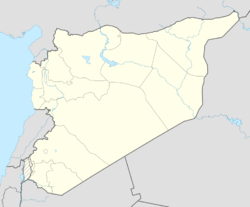Deir Ali
| Deir Ali دير علي |
|
|---|---|
| Village | |
| Coordinates: Lua error in package.lua at line 80: module 'strict' not found. | |
| Country | |
| Governorate | Rif Dimashq Governorate |
| District | Markaz Rif Dimashq |
| Nahiyah | Al-Kiswah |
| Population (2004 census)[1] | |
| • Total | 4,368 |
| Time zone | EET (UTC+2) |
| • Summer (DST) | EEST (UTC+3) |
Deir Ali (Arabic: دير علي) is a small town in southern Syria, administratively part of the Rif Dimashq Governorate. According to the Syria Central Bureau of Statistics, Deir Ali had a population of 4,368 in the 2004 census.[1] Its inhabitants are predominantly members of the Druze community.[2]
The Arab Gas Pipeline passes through the area, and it supplies gas to an ultramodern power station (estimated cost 250 million Euros), located in the town; the pipeline junction at the power station links the power grids of Egypt, Syria, and Jordan.[3] The town was historically a village known as Lebaba, and contains the archaeological remains of a Marcionite church. These include an inscription dated to 318 CE, which is the oldest known surviving inscribed reference, anywhere, to Jesus:
- The meeting-house of the Marcionists, in the village of Lebaba, of the Lord and Saviour Jesus the Good -Erected by the forethought of Paul a presbyter, in the year 630 Seleucid era[4]
References
- ↑ 1.0 1.1 General Census of Population and Housing 2004. Syria Central Bureau of Statistics (CBS). Rif Dimashq Governorate. (Arabic)
- ↑ Firro, 1992, p. 34.
- ↑ [1]
- ↑ Philippe Le Bas and William Henry Waddington, Greek Inscriptions grecques et latines recueillies en Grèce et en Asie Mineure (1870), volume 3, inscription 2558. Minor reference in Gerhard Kittel, Theological Dictionary of the New Testament, under Synagogue. Also obliquely referenced in the Catholic Encyclopedia article on Marcionites, using Le Bas and Waddington as a reference
Bibliography
- Lua error in package.lua at line 80: module 'strict' not found.

